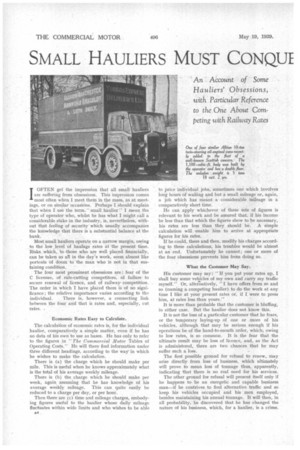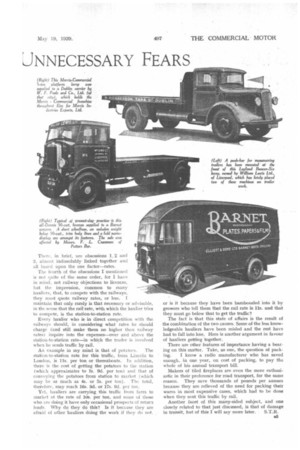SMALL HAULIERS MUST CONQUE LiN NECESSARY FEARS An Account of
Page 38

Page 39

If you've noticed an error in this article please click here to report it so we can fix it.
Some Hauliers' Obsessions, with Particular Reference to the One About Competing with Railway Rates IOFTEN get the impression that all small hauliers are suffering from obsessions. This impression comes most often when I meet them in the mass, as at meetings, or on similar occasions. Perhaps I should explain that when I use the term," small haulier " I mean the type of operator who, whilst he has what I might call a considerable stake in the industry, is, nevertheless, without that feeling of security" which usually accompanies the knowledge that there is a substantial balance at the bank.
Most small hauliers operate on a narrow margin, owing to the low level of haulage rates at the present time. Risks which, •to those who are well placed financially, can be taken as all in the day's work, seem almost like portents of doom to the man who is not in that sustaining condition.
The four most prominent obsessions are : fear of the C licensee, of rate-cutting competitors, of failure to secure renewal of licence, and of railwaycompetition. The order in which I have placed them is of no significance; the relative importance varies according to tM individual. There is, however, a connecting link between the four and that is rates and, especially, cut rates. .
Economic Rates Easy to Calculate.
The calculation of economic rates is, for the individual haulier, comparatively a simple matter, even if he has no data of his own to use as bases. He has only to refer to the figures in " The Commercial Motor Tables of Operating Costs." He will there find information under three different headings, according to the way in which he wishes to make the calculation.
There is (a) the charge which he should make per mile. This is useful when he knows approximately what is the total of his average weekly mileage: There is (b) the charge which he should make per week, again assuming that he has knowledge of his average weekly mileage. This can quite easily be reduced to a charge per day, or per hour.
Then there are (c) time and mileage charges, embodying figures useful to the haulier whose daily mileage fluctuates within wide limits and who wishes to be able to price individual jobs, sometimes one which involves long hours of waiting and but a small mileage or, again, a job which has meant a considerable mileage in a comparatively short time.
He can apply whichever of these sets of figures is relevant to his work and be assured that, if his income be less than that which the figures show to be nece.a ry, his rates are less than they should he. A simple calculation will enable him to arrive at appropriate figures for his rates.
If he could, there and then, modify his charges according to these calculations, his troubles would be almost at an end. Unfortunately he cannot; one or more of the four obsessions prevents him from doing so.
What the Customer May Say.
His customer may say : "If you put your rates up, I shall buy some vehicles of my own and carry my traffic myself." Or, alternatively, "I have offers from so and so (naming a competing haulier) to do the work at any time I like at your present rates or, if I were to press him, at rates less than yours."
It is more than probable that the customer is bluffing, in either case. But the haulier does not know this.
It is not the loss of a particular customer that he fears, or the temporary laying-up of one or more of his vehicles, although that may be serious enough if his operations be of the hand-to-mouth order, which, owing to low rates, is so common. It is the fear that the ultimate result may be loss of licence, and, as the Act is administered, there are two chances that he may suffer such a loss.
The first possible ground for refusal to renew, may arise directly from loss of business, which ultimately will prove to mean loss of tonnage thus, apparently, indicating that there is no real need for his services.
The other ground for refusal will present itself only if he happens to be an energetic and capable business man—if he contrives to find alternative traffic and so keep his vehicles occupied and his men employed, besides maintaining his annual tonnage. It will then, in all probability, be discovered that he has changed the nature of his business, which, for a haulier, is a crime. Then., in brief, are obsessions 1, 2 and 3, almost indissolubly linked together and all based upon the one factor—rates.
The fourth of the obsessions I mentioned is not quite of the same order, for I have in mind, not railway objections to licences, but the impression, common to many hauliers, that, to compete with the railways, they must quote railway rates, or less, I maintain that only rarely is that necessary or advisable, in the sense that the rag rate, with which the haulier tries to compete, is the station-to-4ation rate.
Every haulier who is. in direct competition with the railways should, in considering what rates he should charge (and still make them no higher than railway rates) inquire into the expenses over and above the station-to-station rate—in which the trader is involved when he sends traffic by tail.
An example in my mind is that of potatoes. The station-to-station rate for this traffic, from Lincoln to London, is 11-s, per ton or thereabouts. in addition, there is the cost of getting the potatoes to the station (which approximates to is. 9d. per ton) and that of conveying the potatoes from station to market (which may be as much as 4s_ or 5s. per ton). The total, therefore, may reach 16s. 9d. or 17s. 9d. per ton.
Yet, hauliers are carrying, this traffic from farm to market at the rate of 10s. per ton, and some of those who are doing it have only occasional prospects of return loads. \Vhy do they del this? Is it because they are afraid of other 'hauliers doing the work if they do not,
or is it because they have been bamboozled into it by growers who tell them that the rail rate is us, and that they must go below that to get the traffic?
The fact is that this state of affairs is the result of the combination of the two causes. Some of the less knowledgeable hauliers have been misled and the rest have had to fall into line. Here is another argument in favour of hauliers getting together.
There are other features of importance having a bearing on this matter. Take, as one, the question of pack ing. I know a radio manufacturer who has saved enough, in one year, on cost of packing, to pay the whole of his annual transport bill.
Makers of tiled fireplaces are even the more enthusiastic in their preference for road transport, for the same reason. They save thousands of pounds per annum because they are relieved of the need for packing their wares in most expensive cases, which had to be done when they sent this traffic by rail.
Another facet of this many-sided subject, and one closely related to that just discussed, is that of damage in transit, but of this I will say more later. S.T.R.




















































































